| Reviews & Columns |
|
Reviews DVD TV on DVD Blu-ray 4K UHD International DVDs In Theaters Reviews by Studio Video Games Features Collector Series DVDs Easter Egg Database Interviews DVD Talk Radio Feature Articles Columns Anime Talk DVD Savant Horror DVDs The M.O.D. Squad Art House HD Talk Silent DVD
|
DVD Talk Forum |
|
|
| Resources |
|
DVD Price Search Customer Service #'s RCE Info Links |
|
Columns
|
|
|
Dangerous Liaisons
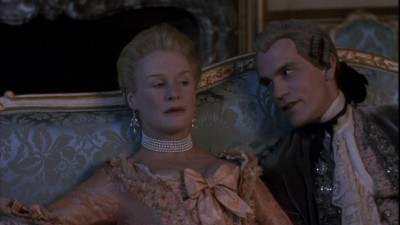
Please Note: The screen captures used here are taken from the 1997 standard-definition DVD edition, not the Blu-ray edition under review.
It's rare enough for a fondly-remembered but not recently revisited film to even live up to our lingering, benevolent but hazy recollections of it; it's rarer still for that film to surpass them and reveal further wellsprings of cinematic finesse and dramatic power. But that is the pleasant surprise that Stephen Frears's 1988 Best Picture nominee, Dangerous Liaisons--just released on Blu-ray with a gorgeous transfer--holds in store. Do you remember it, like I did, as a titteringly ribald, eventually rather dark sex comedy that takes place among a group of morally decayed remnants of a dying aristocracy, a sort of nastier-and-more-fun-than-usual period piece? It certainly does fit that description well enough, but another look reveals that it's so much more: a career peak for a well-regarded director and three distinguished actors; an unusual-for-its-time Hollywood production that dares to resurrect a truly fine-crafted, highly intelligent written and visual sensibility last seen in those parts somewhere on Sunset in the early '60s, thumbing a ride out of town; and above all, a work that pulls off a tonally quite tricky and impressive balancing act between sardonic sexual gamesmanship, wicked (if subtle) sociopolitical allegory, and intensely absorbing, emotionally devastating drama to become a "period piece" that's both much more of its moment of theatrical release and more enduring than anyone could have realized before it had had a chance to vindicate itself so well against the test of time.
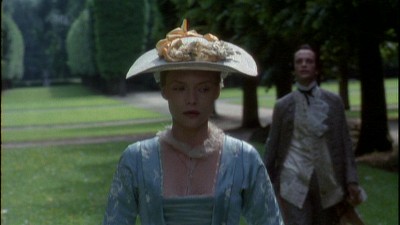
Adapted for the screen by Christopher Hampton (who went on to write David Cronenberg's A Dangerous Method) from his popular stage play, which in its turn was adapted from a scandalous 1782 French novel by Choderlos de Laclos, Dangerous Liaisons tells the story of notorious seducer the Vicomte de Valmont (John Malkovich) and his former lover, the Marquise de Merteuil (Glenn Close), two wealthy, bored aristocrats who are deceitful and hypocritical libertines, dissipated creatures on the hunt for the sadistic pleasure that only cruelty and power games played with the hearts of the meek, innocent, and unworldly can provide. Two such naive souls are near at hand in the form of Céleste (a luminous Uma Thurman), the virginal, convent-educated daughter of the Marquise's comically hen-like, mindlessly prudish cousin (an expertly hilarious Swoosie Kurtz), and Céleste's young paramour, the poor music instructor Raphael Danceny (Keanu Reeves). The two vicious, arrogant, and emotionally inured sophisticates easily pounce on and make short work of these two wide-eyed dupes.
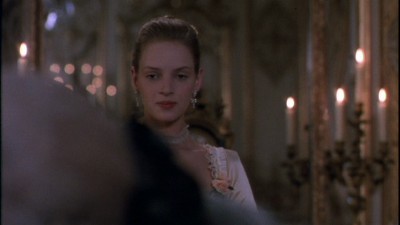
But it's too easy to destroy such easy prey. The Vicomte likes a challenge, and the much harder nut to crack is an acquaintance of his aunt's, Mme de Tourvel (Michelle Pfeiffer, alarmingly fragile in one of her best-ever performances), a fortress-like paragon of virtue it would be so much nasty fun to bring down. The Marquise makes a deal with the Vicomte that gets them both excited: a night back in her bed if he can mastermind a way to tempt the untemptable Mme de Tourvel into adultery. But as the Vicomte turns on his chameleon-like charm to seduce the steadfast but not-quite-impenetrable de Tourvel, his proximity to such a true, open heart makes the influence flow in an uncomfortably reciprocal way, and he finds himself feeling, shockingly, real love where he'd intended only a mean travesty of it. The possibility of his feeling a true love for de Tourvel that the Marquise never allowed him to feel for herself makes her, too, feel some discomfitingly genuine emotion--actual love and jealousy, either of which she and the Vicomte ordinarily dismiss as signs of ludicrous, laughable weakness. What these two begin by trying to do to others is ugly, but it has nothing on the terror that will rain down on their own hearts--so enfeeblingly long-protected behind the armor of sneering condescension and cruelty--when they're finally, inevitably exposed to the light of day.
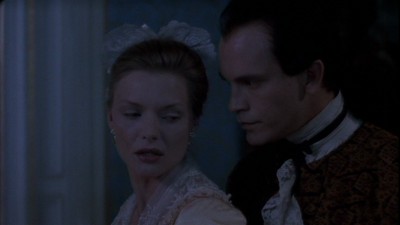
Hampton's writing is sharp and savage in a way that slides imperceptibly from funny to wrenching, and his scenario is played out, his dialogue delivered by actors who seem to have been born to play these roles. The surest sign of good casting is usually its invisible aura of inevitability, but this is one movie whose immaculate casting is truly outstanding and remarkable. Malkovich, with his sinister features and mocking mannerisms, is the perfect Vicomte; Close physically inhabits the Marquise in a way that suggests actual possession (her face is key to the film's power, and it goes through its transfigurations from steely, icy mask to rage to misery laid bare in a way that breaks you apart); and Pfeiffer's willowy, delicate beauty and softness of delivery makes you genuinely fear for the poor Mme de Tourvel. And Frears (The Grifters, High Fidelity)--a skilled craftsman whom I've never thought of as having much of a distinctive, personal visual style at all--does a great service to Hampton's story and the actors' performances by making this a period piece more in the close-in manner of a Cries and Whispers than the panoramic way of a Barry Lyndon. He uses mainly medium shots and close-ups to get us up close and personal with people who expend most of their energy deflecting such intimacy, preferring to project it outward into a material world of elaborately deceptive appearances, and that formal strategy creates a very nice, bristling tension throughout. Dangerous Liaisons is not a great film in the way Cries and Whispers is, but, above and beyond being funnier and sexier, it does possess a surprisingly rich vein of just that kind of Bergman-trademarked emotional and psychological incisiveness, which Frears taps into every time he gives us another too-close view of these characters who play fast and loose with intimate matters. The film's deservedly famous final shot--an extreme close-up in which the Marquise wipes off her cosmetic mask and a long-suppressed tear emerges onto her now truly naked cheek, revealing what it looks and feels like when the seriousness of matters of the heart is driven home for the first time to a callous sensibility--is, indeed, worthy of Bergman in its simple, demolishing potency.
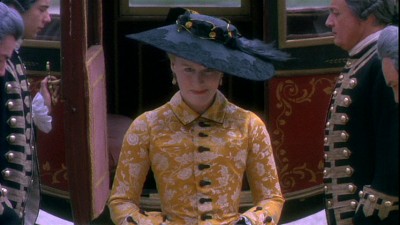
All of that gives Dangerous Liaisons an emotional power that's for the ages and will outlast any more immediate/local resonances the film has, but an additional striking aspect, which I only noticed this time around, was some well-sublimated but unmistakable social/political allegory woven very slyly into the film's texture by Hampton and Frears. Yes, it has generally satirical elements, recognizable from any time and place, having to do with the destructive overprivilege of the elite classes, but given that both of its principal authors are Englishmen and that Hampton tweaked the screenplay extensively in the late '80s when adapting it from his long-developing (read: pre-Thatcher) stage play, you'd have a hard time convincing me that Close is not, like Michael Gambon in the next year's The Cook, the Thief, His Wife, and Her Lover, playing some critical, disgusted iteration of Margaret Thatcher, and in a way much more freshly inspired and relevant than the nostalgic/amnesiac coziness to come, which has proven able to produce actual, horror-effacing Thatcher biopics. But you can ignore or embrace that particular rewarding strain of the film as you wish; it's engaging, smart, and clever, but so is the film in its entirety, and the parodic treatment it reserves for the Thatcher era is only one among a wide variety of more direct stings that this enduringly potent, deeper-than-you-remember Dangerous Liaisons has in its tail.
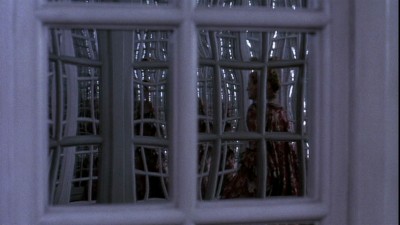
THE BLU-RAY DISC:
I'm very ambivalent about the studios' habit of releasing films shot and originally shown at a 1.85:1 aspect ratio as DVDs and Blus that present the feature at a 1.78:1 aspect ratio, as does this edition of Dangerous Liaisons. (It's particularly annoying that they try to pass it off as "1.85:1" on the packaging, which amounts to either a negligent or purposely misleading claim.) However, every resource I can find says the difference is "nil," and there is no noticeable problem with or deficiency in the widescreen image as it's presented. On the aspect ratio front, it's no different from the DVD, which was also 1.78:1, but the actual picture quality is vastly, vastly improved. Making the comparison to my old DVD edition, I could barely stand to watch that prior release's murky, blotchy, patchy transfer after having been treated to the conscientious restoration of the film's visual glories when watching the Blu-ray. Cinematographer Philippe Rousselot's supple and very skillfully-lit shots (with many nuances of shading and light and cool and warm colors, as necessitated by the pre-electric-lighting period of the film) are faithfully rendered, with no noise/over-noise-reduction, aliasing, or edge enhancement to be seen. A superb transfer of a superb-looking film.
Sound:The DTS-HD Master Audio 5.1 soundtrack is excellent--pure, clear, resonant, capturing all the layers and complexities of the sound design, with the audio quality of the dialogue equally sharp to the words themselves, and with Glen Fenton's richly baroque and moody score restored to full-bodied but never overwhelming richness.
Extras:--The film's original U.S. theatrical trailer, a supplement carried over directly from the old DVD release (VHS/1.33:1 quality and all) is an interesting bit of marketing with, of course, the ribaldry overemphasized and the devastation downplayed.
--A feature-length audio commentary with director Frears and writer Hampton is curiously, almost funnily subdued; if you want an example of cultural differences between Brits and Americans, listen to the long, long spaces left by the reticence of these two older Englishmen to speak out of turn or out of place. When they do talk, however, what they have to say is quite revealing about the sometimes surprisingly gossip-juicy details of the shoot (those costumes understandably made for some cranky actors on occasion) and the long development of the project. Frears's comments on "finding" the film with the camera and the actors is both fascinating for us laypersons and of informative value to any aspiring filmmakers. (He assumed it would be a Max Ophuls/Barry Lyndon type of thing but found that the material and performances would be better suited to the Bergman-like approach that we have in the finished work, with a fine but restrained consciousness of the space around the actors alternating with almost violating close-ups on faces, which definitely bear out his finding.)
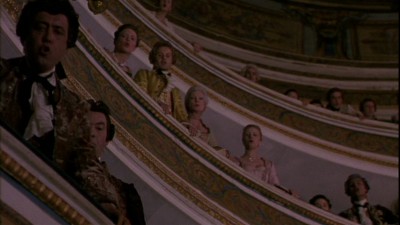
Assuming you have already seen Dangerous Liaisons (and if you haven't, you will definitely want to), you probably recall it as a very good, worthwhile bit of fine cinematic craftsmanship, but it is actually even better than you remember. The shock and fascination of the decadently, erotically cruel that comes with initial viewings is still there, but this is a rich film, yielding up further layers each time you experience it. All its laughter-inducing dark humor is the first, most immediately recognizable stratum, but there is much more beyond that--Christopher Hampton's meticulously structured drama and witty, sophisticated dialogue; the very well-considered, aesthetically pleasing, and complementarily evocative visual strategies; and the sharp, stinging emotional potency that takes you by surprise every time. Its very high-quality (if relatively low-on-extras) new restoration for Blu-ray, a medium on which the film looks and sounds as it really should for the first time in any home-video media (at least in Region 1), as well as its promise of many pleasurable, bracing, and rewarding repeat viewings make this release of Dangerous Liaisons is an addition to your video library that will pay off very well, and it is Highly Recommended.
|
| Popular Reviews |
| Sponsored Links |
|
|
| Sponsored Links |
|
|
| Release List | Reviews | Shop | Newsletter | Forum | DVD Giveaways | Blu-Ray | Advertise |
|
Copyright 2024 DVDTalk.com All Rights Reserved. Legal Info, Privacy Policy, Terms of Use,
Manage Preferences,
Your Privacy Choices | |||||||













